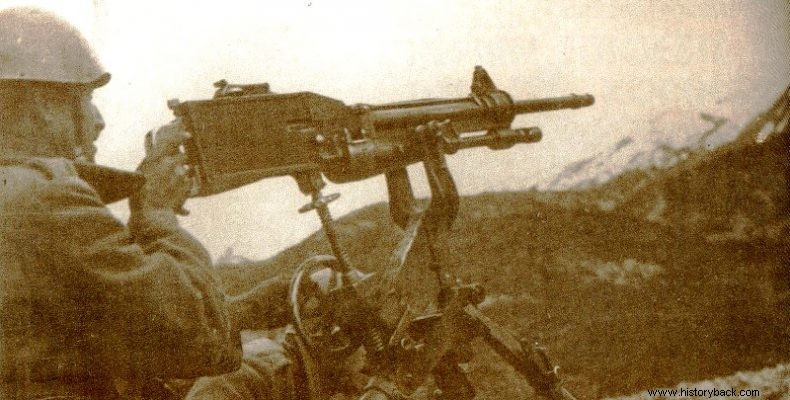
On October 28, the Italians marched into the Pindos sector with the 3rd Alpinist Division "Julia". The Italian Alpinists pushed back the Greek part of the Pindos Detachment and created, within the following days, a very dangerous enclave for the Greek formation. The Greek headquarters reacted by sending reinforcements to the threatened sector and assigning command to Major General Vasilios Vrachnos, commander of the 1st Infantry Division.
At dawn on November 1st, Vrachnos, having already carried out the previous reconnaissance of the area, ordered all the divisions at his disposal to attack. The small Greek forces were divided into three regular groups. The northern one had 2 infantry companies, under lieutenant colonel Misiris, a cavalry company, under lieutenant colonel Georgiadis, and 2 cannons. This group was supposed to attack the area of Kato Arena, with the objective of the village of Lykorachi.
The central group, under Colonel Davakis – 2 infantry companies, 4 machine guns, 2 cannons – would attack towards the village of Fourka, with the objective of capturing the hill of Prophet Ilias. Finally, the southern group – 2 infantry companies, 8 machine guns, 4 artillery pieces, a cavalry ulama – under Major Karavias, would attack north of Fourka, with the aim of supporting the action of the central group. In total, along the entire length of the front Vrachnos would attack against "Julia" with 6 infantry companies and 12 guns !
With the 8th Alpinist Regiment, the Italians were pressing the Greek units at the Romiou pass, with the aim of capturing Samarina and then Metsovo. Vrachnos, not having the necessary forces to stop the Italians at Romio, decided to attack their bodyguards. If the entire 8th Mountaineer Regiment broke through them, it would be in danger of being surrounded.
Lycorachi
Very early in the morning the departments started. In the northern complex, the cavalry division was placed as a vanguard. The cavalry, despite the terrain difficulties, moved quickly. At around 07:30 the scouts reported to Major Georgiadis that they spotted an enemy unit, about 300 men, with their transports, moving east of Lykorachi. Georgiadis immediately developed the island. The Greek horsemen, without being noticed, almost surrounded the Italian division. With the ulama of mortars on the one hand and the machine guns on the other, the ulama of horsemen rushed at the Italians.
At the same time the 2 Greek machine guns and the 2 mortars opened fire. The Italians, receiving fire from three directions, were completely taken by surprise. Unable to face the Greek pressure, they retreated to the village of Lykorachi. There was also another Italian section. All together the Italians barricaded themselves in the houses of the village and began a stormy fire. The horsemen returned fire and the battle raged in the village. The horsemen, although the Italians were twice as many, continued the fight against them alone. They fought like this for over 3 hours. In the meantime, around 11:00 a.m., Misiri's division also arrived in the village and attacked in turn.
The Italians resisted bravely and only surrendered at 17.00 in the afternoon. But the victory, the first of the Greeks at Pindos, was now a fact, despite the heroism of the Italians. The Italian prisoners alone reached 210. The dead were also many. 120 mules were also captured, loaded with supplies, a valuable gift for the Greek divisions. The battle cost the island one dead and one wounded. The infantry had 30 dead and wounded. Among the latter was Lt. Col. Misiris, who remained wounded for 6 hours on the battlefield, encouraging his men and only after the surrender of the Italians did he accept to be taken back to treat his wounds.
Davakis, Spyropoulos, Koumbourlis
Further south, the Davaki group also succeeded in capturing part of the enemy positions, thanks to the heroism of the 2nd Company of the 2/51 SP. Its commander, second lieutenant Spyropoulos, personally led his men and with the lance and grenades they overthrew the elite Italians. Spyropoulos himself neutralized the Italian machine guns that had pinned down his men. But the big hero of the day was the reserve quarterback Koumbourlis.
He too was put in charge of his platoon, neutralized enemy machine guns with grenades, but was wounded. Still he refused to abandon his men and continued until he was wounded a second time. But again he did not give up, although he could no longer move. He remained in position and with shouts and shouts urged his men to continue the attack! But the biggest drama unfolded a little further south, on the hill of Tsoukas. The hill was held by the Italians with strong forces.
Diakos &Daskas
The 2nd Company of the 1/4 Infantry Battalion moved against him, led by a lieutenant from the then enslaved Halki of the Dodecanese, Alexander Diakos. The company, with Diakos, literally at the head, rushed upon the Italians. The cry "Air" was heard in the frozen mountains. The Italians, however, put up fierce resistance. However, the Greek lance worked wonders and Tsouka was captured. But the enemy does not give up. He counterattacks and throws the Greeks back. Then Diakos counterattacks in turn, but is parried.
He repeats the attempt, but an Italian machine gun mows them down. The reserve lieutenant Daskas and 4 soldiers also fall next to him. They were the first dead Greek officers of the Hellenic Army to be killed in Albania. The Air Force had managed to steal the sad, yet so glorious "first" from them, a day before, with Lieutenant Commander Evangelos Giannaris. The Vrachnos counter-attack on its northern flank alone had completely succeeded. Nevertheless, it marked the big change. As the late Terzakis wrote, “The rock had stopped rolling. Now they had to turn him back!
